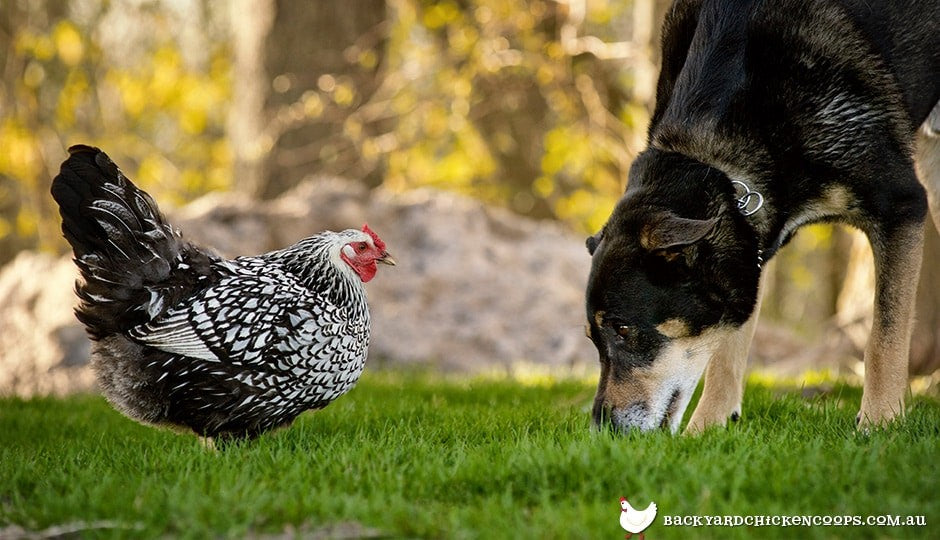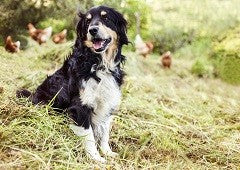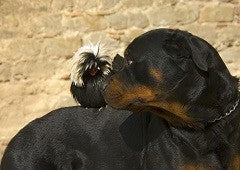Dogs and chickens. When most people think of these animals together, they conjure up images of terrorised chickens, dogs jaws and claws in action, and a cloud of feathers. And while sometimes this can be the case, there are many instances where dogs and chickens can live in perfect harmony- with a dog even being a valuable asset to a flock!
While birds don’t take to being licked and played with by dogs like some other animals, with the proper training your dog can become a reliable chicken guard- playing safely with the chickens and scaring off pesky predators who could potentially harm your hens.
We’re going to be honest with you- it can take quite some time, patience and persistence before your playful pets are the best of pals, but knowing your girls are safe while free-ranging unsupervised under the watchful eye of their protector makes it all the worthwhile!
While almost all dog breeds can be trained to be tolerant of chickens, some breeds are easier to train than others. However, it really does come down to the trainer- YOU!
How to do it
If your dog knows basic commands such as sit, stay, off and heel you’re already halfway there and the introductions can commence. Because they are unfamiliar with one another, this should be done in a safe and controlled environment- your dog on a leash and your chickens secured in their coop.
Take your dog out towards the coop, being sure to watch their reaction as you approach the chickens- this will be a good indication of how it is going to act towards them. Allow them to sniff around and really check the chickens out, but if they start barking, growling or lunging towards them a stern no and noise aversion should be used.
Noise aversion is when you make a sound that the dog dislikes i.e. a clap, or ‘no’ etc. They learn to associate this noise with their behaviour, and that in order to make the noise stop, they must stop their behaviour.

Consequently, if they remain calm and display good behaviour they should be rewarded. This can be done through a pat, praise, or even a small treat.
This meeting should take place several times until your dog seems completely calm and at ease with your flock- relaxed body and ears, not paying much attention to the chicks. Practice basic commands such as sit, stay and off while in their company- being sure to praise your dog when they perform each action.
Once they have mastered this, it’s time to go off leash (still very much under the watchful of you though!) Let them wander around the coop and investigate the chickens, and practice their basic commands off leash until they have become accustomed to the birds and continue to behave and remain calm around them. It is important to use praise here and a calm voice- this is to reassure them that they are displaying good and the correct behaviours.
Now that your dog is familiar with the chickens and they are no longer seen as a threat, you can now introduce them without the confines of the coop- this is the start of a budding friendship! At first, keep your dog on it’s leash just to be safe in case something goes awry.
Like before, let your dog really sniff out and investigate your chickens, and practice their commands several times in this setting. As they become more comfortable and both your chickens and dogs appear relaxed, you can start to let your dog off the lead for small periods of time- increasing this time as you go. Be sure to stay close and with the lead at the ready just in case your canine companion decides to get a little adventurous!

The more regularly this is performed, the more familiar the animals will become with one another, and it won’t be long until they both know that neither is a threat to the other, nor trespassing on their territory. Soon enough your two pets will be able to mingle together unsupervised, and a blossoming friendship will be formed!
It is best not to try and rush this process, allowing it to take as long as need be- whether this is one month or four- it’s better to be safe than sorry! It is important to know that your dog is completely desensitised by the chickens, and that their presence no longer stimulates or excites them.
Not only will they provide great companionship for one another, but your dog is sure to chase away pesky predators that are lurking nearby looking to make your chickens a tasty meal. Plus you will delight in watching your feathered flock and canine companion wandering around the garden together and exploring- a real sight to behold!
So with a bit of training and a lot of patience and persistence your dogs and chickens can co-exist peacefully, and even be the very best of buds!
As chicken keepers, we want our backyard to be a place of safety and happiness with harmony between feathered and furry friends. There are just so many things to consider when becoming a chicken parent from shelter to health issues. Many chicken keepers struggle to handle chicken health or behaviour issues, especially in the first few years of having a flock.
This is why I recommend Chickenpedia to all my readers. They have comprehensive online courses on everything you didn’t know you need to know and then some more! From healthcare to raising baby chicks to feeding and behavior, you’ll find beginner-friendly courses that’ll give you the knowledge and confidence to successfully look after your chickens.
As a member, you will get access to ALL their fantastic courses. No need to wing it, become the ultimate chicken eggspert! Check out Chickenpedia today!


















